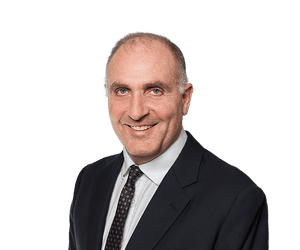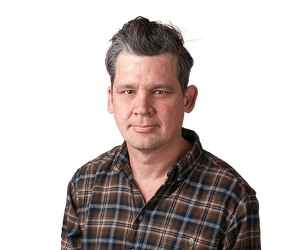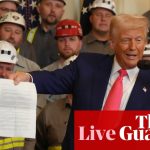Trump prepares to tour wildfire damage in Los Angeles after criticising California’s water policy
Trump has erroneously claimed that California could have mitigated the wildfires sooner if it hadn’t been for redirecting water to the Pacific Ocean. The president was referring to the water federally managed by the Central Valley Project.
However, the agency mostly supplies farms and doesn’t carry water to Los Angeles. Meanwhile, The Metropolitan Water District of Southern California says it has ample storage to meet the region’s water needs.
In the first hours of his second term, Trump encouraged federal officials to route more water to the crop-rich Central Valley and densely populated cities in the southern part of the state, even threatening to withhold federal disaster aid unless state leaders change their approach on water.
He has continued to question how California’s water managed. Last year on his Truth Social platform, he criticized the “rerouting of MILLIONS OF GALLONS OF WATER A DAY FROM THE NORTH OUT INTO THE PACIFIC OCEAN, rather than using it, free of charge, for the towns, cities, & farms dotted all throughout California”.
Trump has suggested that state officials “ turn the valve ” to send more water to the city. But state water supplies are not to blame for hydrants running dry and a key reservoir near Pacific Palisades that was not filled
California’s water system is complicated.
Most of the region’s water is in the north, while the bulk of the state’s population is in the drier south. Los Angeles is the second driest city in America and relies on water from elsewhere. As does the dry Central Valley, where most of California’s produce is grown.
Two complex systems of dams and canals move rain and melted snow from the mountainous north to the south. One is managed by the federal government, the Central Valley Project, while the other is operated by the state of California and known as the State Water Project. Both systems channel water through the Sacramento-San Joaquin River Delta, an estuary supporting wildlife, including salmon and the delta smelt.
The Los Angeles Department of Water and Power also manages its own aqueducts that draw water from the eastern Sierra Nevada. The Federal government decides how much water is routed to the delta to protect threatened species and how much goes to Central Valley Project users, mostly farms. That project does not supply water to Los Angeles.
However, Trump insists the state lets too much water go to the ocean rather than cities and farms.
Key events
70% of Americans do NOT approve of Musk in government
Photograph: Beata Zawrzel/NurPhoto/REX/Shutterstock
Many Americans agree that the federal government is beset by inefficiency, corruption and needless bureaucracy, but they are less sure about whether aspiring trillionaire Elon Musk is the right person to tackle it.
An Associated Press-NORC Centre for Public Affairs Research poll shows only 30% adults in the USA strongly or somewhat approve of President Donald Trump’s Department of Government Efficiency (DOGE), which Musk leads.
The poll also shows, despite prevailing wisdom on some social media sites, that Americans aren’t particularly worried about “deep state” actors undermining Trump’s Republican agenda. They’re also unmoved about cuts to large numbers of federal jobs and moving federal agencies outside Washington.
Americans dislike Musk and are suspicious of billionaires and their influence.
Only one third of US adults have a favourable view of Musk, the world’s richest person. Approximately half of Americans think of Musk and Trump in unfavourable terms. US adults broadly think it’s a bad thing if the president relies on billionaires for advice about government policy, according to the poll.
About 60% of those polled say this would be a “very” or “somewhat” bad thing, while only about 1 in 10 call it a very or somewhat good thing, 3 in 10 are neutral.
The United Nations says the right to seek asylum is “universally recognised” after Trump suspended all refugee admissions and halted the US asylum programme.
“All states are entitled to exercise their jurisdiction along their international borders, [but] they need to do so in line with their human rights obligations,” UN rights office spokeswoman Ravina Shamdasani says, according to AFP news agency.
“The right to seek asylum is a universally recognised human right,” she adds.
On Monday, Trump signed an executive order suspending the Refugee Admissions Program, saying the US “lacks the ability to absorb large numbers of migrants, and in particular, refugees, into its communities”.
The move blocked 1,600 approved Afghan refugees from moving to the States, while over 3,000 others are waiting in Albania to be resettled.
The UNHCR said yesterday that “refugee resettlement is a life-saving measure”, and they are “ready to continue our work with the new administration to find solutions for refugees”.
Mariann Edgar Budde
Unity, in this sense, is the threshold requirement for people to live together in a free society, it is the solid rock, as Jesus said, in this case upon which to build a nation. It is not conformity. It is not a victory of one over another. It is not weary politeness nor passivity born of exhaustion. Unity is not partisan.
Rather, unity is a way of being with one another that encompasses and respects differences, that teaches us to hold multiple perspectives and life experiences as valid and worthy of respect; that enables us, in our communities and in the halls of power, to genuinely care for one another even when we disagree. Those across our country who dedicate their lives, or who volunteer, to help others in times of natural disaster, often at great risk to themselves, never ask those they are helping for whom they voted in the past election or what positions they hold on a particular issue. We are at our best when we follow their example…
German politician suggests Canada joins the EU

Ashifa Kassam
Germany’s former foreign minister has suggested that Canada be invited to join the European Union, giving voice to an unlikely proposition that has quietly circulated since Donald Trump began floating the idea of Canada becoming the US’s 51st state.
Speaking to Germany’s Pioneer Media, Sigmar Gabriel pointed to the shifting geopolitics ushered in by Trump’s second term. “We should invite Canada to become a member of the European Union,” said Gabriel, adding: “They are more European than some European member states anyway.”
Gabriel, who was also Germany’s vice-chancellor from 2013 to 2018, said it was an idea worth pursuing, even if Canada is not geographically located in Europe. “I would give it a try. Canada is an enormously important country. It is, by the way, a strategic Arctic border state … We need to gather allies. That also applies to our free trade agreements.”
His suggestion echoed an opinion column published earlier this year in The Economist and which argued that the union would be beneficial for both as “Canada is vast and blessed with natural resources but relatively few people, while the EU is small, cramped and mineral-poor’.
On Thursday Trump again called on Canada to join the US as he addressed the Davos economic forum in Switzerland by video link: “As you probably know, I say, ‘You can always become a state, and if you’re a state, we won’t have a deficit. We won’t have to tariff you.’”
Canadian officials have repeatedly slammed any such suggestion, with one minister describing it as something out of a “Southpark episode.” Polls carried out in recent weeks on both sides of the border have suggested that the vast majority of Canadians and many Americans disapprove of the idea.
Moscow rejects president Donald Trump’s suggestion that a settlement in Ukraine can be achieved by falling oil prices
In an address to the annual World Economic Forum on Thursday, Trump said that the OPEC+ alliance of oil exporting countries shares responsibility for the ongoing Ukrainian War due to keeping oil prices too high. Trump said that “if the price came down, the Russia-Ukraine war would end immediately”.
Asked about Trump’s comments, Kremlin spokesperson Dmitry Peskov said: “The conflict doesn’t depend on oil prices,” Peskov said in a conference call with reporters. “The conflict is ongoing because of the threat to Russia’s national security, the threat to Russians living on those territories and the refusal by the Americans and the Europeans to listen to Russia’s security concerns. It’s not linked to oil prices.”
Asked to comment on Trump’s claim that Ukrainian president Volodymyr Zelenskyy is ready for a deal, Peskov said: “Zelenskyy can’t be ready for a deal.” He added: “In order to reach a settlement it’s necessary to conduct talks, and Zelenskyy forbade himself to hold talks by his own decree.”
On Wednesday, Trump threatened Russia with more tariffs, taxes and sanctions if they don’t end the war.
Peskov said that the Kremlin was paying close attention to Trump’s statements, insisting Moscow “remains ready for an equal dialogue, for a mutually respectful dialogue”.
“This dialogue took place between the two presidents during Trump’s first presidency. And we are waiting for signals that we have not received yet,” Peskov said.

John Crace
Spare a thought for the grifters. Those sad Brits who have spent years toadying up to Donald Trump in the belief they had been admitted into his gilded inner circle. Those men and women who bravely posted selfies on X as they arrived in Washington in the belief they would be attending the inauguration of The Donald.
There was Liz Truss looking like a cheap Paddington Bear in a blue coat and red Maga hat announcing her arrival in DC. Only to go mysteriously silent when she discovered she hadn’t made the cut. Not just to the Rotunda where the main action was being staged but also not to the overspill area in the Capitol where guests could follow proceedings on TV. Presumably Lizzie was left to watch the action on her phone in a McDonald’s somewhere downtown…
Russia open to nuclear talks
Russia says it is open to negotiating nuclear disarmament, the BBC reports.
The Russian government will work with Washington, but only if the nuclear weapons of the UK and France are on the negotiation table, Kremlin spokesperson Dmitry Peskov said.
Peskov’s comments come in the aftermath of US president Donald Trump’s announcement on Thursday that he wanted to work towards reducing nuclear arms.
Trump indicated that Russia and China could possibly support reducing their own nuclear arsenals.
Peskov said: “We are certainly interested in starting the negotiation process as soon as possible.”
But he also added: “In the current situation, all nuclear capacities need to be taken into account. In particular, it’s impossible to hold a conversation without taking into consideration the nuclear capacities of France and the United Kingdom. The current realities make it necessary.”
Stephen Collins

Jason Wilson
In a series of newly unearthed podcasts, Pete Hegseth, Donald Trump’s pick for defense secretary, appears to endorse the theocratic and authoritarian doctrine of “sphere sovereignty”, a worldview derived from the extremist beliefs of Christian reconstructionism (CR) and espoused by churches aligned with far-right Idaho pastor Douglas Wilson.
In the recordings, Hegeth rails against “cultural Marxism”, feminism, “critical race theory”, and even democracy itself, which he says “our founders blatantly rejected as being completely dangerous”.
For much of the over five hours of recordings, which were published over February and March 2024, Hegseth also castigates public schools, which he characterizes as implementing an “egalitarian, dystopian LGBT nightmare”, and which podcast host Joshua Haymes describes as “one of Satan’s greatest tools for excising Christ from not just our classrooms but our country”.
Trump to address America’s largest anti-abortion rally
President Donald Trump is due to make a speech via video link to the March for Life rally, America’s largest annual anti-abortion rally later on Friday.
The president pardoned 23 anti-abortion activists a day before the March for Life in Washington DC.
Trump is not the first president to address the rally. Previous Republican presidents, including George W Bush and Ronald Reagan, have addressed the group remotely. However, in 2020, Trump became the first US president to attend the rally in person.
The annual rally began in 1974 after the legalisation of abortion established in Roe v Wade.

Erum Salam
While some have praised Donald Trump for issuing “full, complete and unconditional” pardons for the 1,500 individuals involved in the January 6 attack on the US Capitol, Pamela Hemphill has pushed back.
Hemphill, who was also arrested on January 6, has refused to accept Trump’s pardon, instead deciding to take responsibility for the role she played in trying to overturn the 2020 election results which made Joe Biden victorious over Trump.
“Absolutely not,” Hemphill, 71, told the Guardian on Thursday.
“It’s an insult to the Capitol police officers and to the rule of law and to the nation. It contributes to the propaganda that it was a peaceful protest, that the DoJ is weaponized against them and against Trump.”…
Trump prepares to tour wildfire damage in Los Angeles after criticising California’s water policy
Trump has erroneously claimed that California could have mitigated the wildfires sooner if it hadn’t been for redirecting water to the Pacific Ocean. The president was referring to the water federally managed by the Central Valley Project.
However, the agency mostly supplies farms and doesn’t carry water to Los Angeles. Meanwhile, The Metropolitan Water District of Southern California says it has ample storage to meet the region’s water needs.
In the first hours of his second term, Trump encouraged federal officials to route more water to the crop-rich Central Valley and densely populated cities in the southern part of the state, even threatening to withhold federal disaster aid unless state leaders change their approach on water.
He has continued to question how California’s water managed. Last year on his Truth Social platform, he criticized the “rerouting of MILLIONS OF GALLONS OF WATER A DAY FROM THE NORTH OUT INTO THE PACIFIC OCEAN, rather than using it, free of charge, for the towns, cities, & farms dotted all throughout California”.
Trump has suggested that state officials “ turn the valve ” to send more water to the city. But state water supplies are not to blame for hydrants running dry and a key reservoir near Pacific Palisades that was not filled
California’s water system is complicated.
Most of the region’s water is in the north, while the bulk of the state’s population is in the drier south. Los Angeles is the second driest city in America and relies on water from elsewhere. As does the dry Central Valley, where most of California’s produce is grown.
Two complex systems of dams and canals move rain and melted snow from the mountainous north to the south. One is managed by the federal government, the Central Valley Project, while the other is operated by the state of California and known as the State Water Project. Both systems channel water through the Sacramento-San Joaquin River Delta, an estuary supporting wildlife, including salmon and the delta smelt.
The Los Angeles Department of Water and Power also manages its own aqueducts that draw water from the eastern Sierra Nevada. The Federal government decides how much water is routed to the delta to protect threatened species and how much goes to Central Valley Project users, mostly farms. That project does not supply water to Los Angeles.
However, Trump insists the state lets too much water go to the ocean rather than cities and farms.
Joseph Gedeon
The US Department of State has banned consular posts from flying any flags other than that of the US as part of the Trump administration’s pledge to crack down on diversity efforts in government institutions.
A cable seen by the Guardian titled “One flag policy” appears to target several instances during the Biden administration when gay pride and Black Lives Matters flags were flown at embassies abroad.
Gay pride flags were also on display at the White House during a 2023 Pride month celebration held on the south lawn, sparking a backlash from conservatives…
Gavin Newsom signs $2.5bn relief package as Donald Trump set to visit LA
Gavin Newsom has signed a $2.5bn relief package to help areas of Los Angeles recover from the devastating fires that have been burning for nearly two weeks. The funds were announced during a press conference on Thursday in Pasadena, just outside Altadena, the town hit hardest by the Eaton fire, which ignited on 7 January.
The signing of the bipartisan aid package comes a day before Donald Trump is set to visit the fire-torn areas and amid continued criticism of the California governor and other state officials’ management of the state’s water supply. It also follows a new blaze, the Hughes fire, which sparked on Wednesday morning and quickly grew. It is now 36% contained and has burned nearly 10,400 acres (4,209 hectares), according to Cal Fire.
The largest of the recent Los Angeles-area blazes ignited on 7 January, ripping through the Pacific Palisades neighborhood in Los Angeles and killing 11 people. The Eaton fire, which broke out the same day near Altadena, killed 17 people.
Trump gives Immigration and Customs Enforcement officials powers to quickly deport migrants allowed into the country temporarily by Biden
According to an internal government memo obtained by the New York Times, Immigration and Customs Enforcement (ICE) officials will have powers normally reserved for encounters at America’s border with Mexico to quickly remove migrants.
Stephen Miller, a White House deputy chief of staff and the architect of Trump’s hard-line immigration policies, has made clear that he opposed both programs.
“Here’s an idea: Don’t fly millions of illegal aliens from failed states thousands of miles away into small towns across the American Heartland,” Miller said on social media in September.
Reacting to the memo, Tom Jawetz, a senior lawyer in the Homeland Security Department in the Biden administration, said: “In addition to raising serious legal concerns, subjecting people who played by the rules to a summary deportation process is an outrageous and unprecedented betrayal.”
Karen Tumlin, the director of the Justice Action Center, an immigrant advocacy group, said the decision was a mistake: “American communities have opened their hearts and homes for people from Cuba, Haiti, Nicaragua, Venezuela, Afghanistan and Ukraine,” she said. “Punishing people who did everything the government asked, and many of whom had US-based sponsors, to this summary deportation procedure is appalling.”
Nick Brown, the Washington state attorney general, spoke outside after a federal judge temporarily blocked Donald Trump’s executive order redefining birthright citizenship.
“We came to the courthouse today to defend the United States constitution. To defend democracy in America and to defend what it means to be an American citizen,” Brown said.

Jonathan Freedland
In the first few days of his presidency, people tried to challenge and reason with Donald Trump – suing his administration, questioning his decisions to reporters and pleading to him for mercy. But does Trump care what his critics think? Jonathan Freedland speaks to Susan Glasser of the New Yorker about what we can expect from a leader who goes it alone…
Trump says he’d ‘rather not’ impose tariffs on China
US president Donald Trump says he would “rather not” impose tariffs on China, after repeatedly pledging to hit the nation with hefty import levies.
Trump said he could make a deal with America’s biggest economic rival because “we have something that they want, we have a pot of gold”.
“We have one very big power over China, and that’s tariffs, and they don’t want them, and I’d rather not have to use it. But it’s a tremendous power over China,” he said in an interview with Fox News which aired on Thursday in the United States.
When Trump took office he said 10% tariffs on all Chinese imports could kick in by 1 February – and on the campaign trail touted a levy as high as 60%.
On Friday Beijing called for the US and China to resolve their differences through “dialogue and consultation”.
“China-US economic and trade cooperation is mutually beneficial,” foreign ministry spokesperson Mao Ning said.
“Trade wars and tariff wars have no winners and don’t serve anyone’s interests or the world’s interests,” she added.












